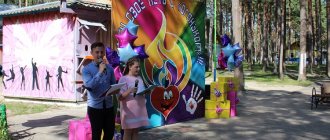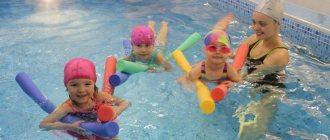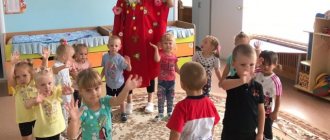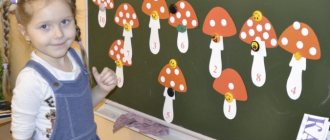Name your profession
For this competition you need to prepare appropriate pictures in advance. The presenter takes turns showing a certain combination of pictures, and the children guess the profession from these pictures. Whoever guessed it raises their hand and answers, for the correct answer they get a point, and whoever has the most points in the end gets a prize. And examples of pictures can be absolutely anything: brick, concrete mixer and trowel (builder); microphone and stage (singer); stethoscope and white coat (doctor); handcuffs and police cap (policeman); broom and trash can (janitor); scissors and hair (hairdresser); pots and white cap (cook) and so on.
Consultation for educators on the topic: Organization of children's leisure time in the summer
One of the most important issues in the work of a child care institution in the summer is the organization of children's leisure time.
Summer is the favorite time of all children, because in warm weather you can spend almost the whole day outside. Our task is to organize the life of children in kindergarten so that they spend it with joy and pleasure and receive a boost of energy even in the city. Working with children outdoors in the summer is not only good for health, but also has great educational value; it helps to develop in preschoolers an interest and love for nature, a caring attitude towards it, develops artistic taste, creative imagination and design abilities, dexterity and ingenuity, and educates hard work, perseverance, patience.
Summer brings big changes to the organization of the educational process of preschool educational institutions. Children are actively involved in games, leisure, entertainment and recreational activities in the fresh air, and the forms of their organization are mainly collective.
Leisure includes a variety of activities: artistic, aesthetic, sports, and musical accompaniment creates a positive emotional mood. The lack of systematic classes significantly relieves teachers and allows them to take a new approach to event planning. Teachers are faced with a problem: how to organize children’s leisure time in an interesting, entertaining, creative way, and captivate them with useful, practical activities. The optimal form of organizing children's leisure in the summer are activities that do not require significant preparation on the part of children, have developmental and educational functions and are carried out in an emotionally attractive manner. — Summer holidays .
- Children's Day (June 1).
- Russian Independence Day – June 12. On this day we organize an exhibition of drawings “I live in Russia”, play folk games, introduce children to various folk genres (fairy tales, songs, riddles, counting rhymes).
- Day of Family, Love and Fidelity (July 8).
A real treasure for organizing summer leisure is the folk holidays: Ivan Kupala (July 6-7), Elijah’s Day (August 2), Honey Spas (August 14), Apple Spas (August 19).
They perform the function of introducing children to the riches of folk culture and developing their national identity. During the holidays, children take part in games, dances, relay races, attractions, and everyone together sings songs, reads poems, guesses riddles, and gets involved in the cultural heritage of society.
- Game minutes. For example, with natural materials (sand, water, earth, plants). Children get acquainted with the different surfaces of plants: smooth, soft, rough.
To develop mathematical skills - measure the required amount of something; sort objects by shape, size; count the number of items in the game, divide the items equally between the participants; divide the finished “cake” into 2-4 parts)
The “Pour and Measure” game using plastic jars, bottles, jugs, and funnels will allow you to clarify the properties of water, and older preschoolers will practice measuring activities. Children love to play with water, especially when they don’t have to be afraid of spilling it and splashing something. Older preschoolers can be given game tasks, for example, pour 5 cups of water into a watering can or measure which bucket will hold the most water.
Everyone knows that you can draw with crayons, but not everyone is familiar with educational games that can be played on the street using ordinary asphalt crayons. With crayons you can outline various objects that are at hand: sandbox molds, the bottom of a bucket, leaves, or, for example, your own hands and feet. From the resulting silhouettes you can make drawings and then paint or shade them. This entertainment will help our children develop fine motor skills.
You can draw different geometric shapes and invite your child to complete them so that they turn into something recognizable. For example: what does a circle look like? It looks like an apple, a balloon, a sun, etc. Children will be able to not only learn the names of geometric shapes, but also develop their imagination.
For kids, the teacher can draw a winding path, and the child must walk along it or roll a car on a string or a ball.
You can draw multi-colored ovals (red, yellow, blue, green) and invite children to jump from one to another like a bunny, naming the colors. Or you can draw the shapes in one color, but make them different shapes (circle, square, triangle). Let the child jump and name the shape of the figures.
Crayons will help us reinforce the names of letters, numbers, and geometric shapes with children. Draw, for example, large letters. Ask your child what letter is drawn here and invite him to walk with his feet along the contour of the letter depicted. In the same way, you can play with numbers and geometric shapes (run in a circle, walk along the sides of a square or triangle).
Game “Logical Sequences” - you draw a logical sequence consisting of two or three elements, and the child must continue it. Example: AAAABA. or 123123, or + — = + — =…
Game “Divide into parts” You draw a figure, and the child must divide it into 2, 3 or 4 equal parts. You can also play Tic-Tac-Toe on the asphalt.
Another interesting game is “Make up a story” or “Make up a fairy tale”, which develops coherent speech and imagination. One of the participants in the game draws 3-4 objects at his own discretion (any), and the other must come up with and tell a story based on them. Then you can change roles. For example, the sun, a butterfly, a flower. This game will allow us to solve the problem of developing children’s ability to distinguish literary genres: story - fairy tale (invite teachers to come up with a short story).
Ball games. Despite its simplicity, ball games are very useful for children, as they develop almost all types of muscles. And it doesn’t matter whether the baby throws or catches the ball, he trains coordination of movements and vision. You can come up with a wide variety of games for summer boys with a ball that you can either throw or kick. — Musical clock. This is a time for a wide variety of musical activities: children can dance, play musical games, learn new songs, sing those that are familiar to them, and play musical instruments. (Christmas tree, sunshine, etc.)
— Travel games. Consecutive visits by children to various points on a pre-prepared route. The plot of the game is thought out in such a way that children visit new places, get acquainted with new phenomena and objects in the role of travelers, sightseers, tourists, and visitors. It is necessary to organize a stop along the route where children will be offered various tasks and games. It is important that travel games are the only type of game whose plot and roles allow for direct teaching of children and the transfer of new knowledge to them. Against the background of positive emotions caused by play motives, children gain new knowledge about nature, and a consciously positive attitude towards it is formed.
— Creative platforms. When organizing creative areas, several workshops are created on the site: in one place children draw, in another they fold origami, in a third they sculpt. A workshop is a space organized so that it is possible to conveniently engage in the proposed type of activity. If possible, you can decorate the workshop - hang a sign with the name, drawings, posters, crafts. Children can take part in any workshop that interests them. Some try themselves in different types of activities, while others limit themselves to one. Younger children will need the help of adults who will accompany them and help them choose an activity they like.
- Exhibitions. Organizing an exhibition is quite labor-intensive, but at the same time it can captivate both children and their parents, for whom visiting an exhibition of children's works will also be of great interest. The exhibition should be held in several stages. At the first stage, its theme is selected and it is determined which products will be accepted for the exhibition. For example, at the exhibition “Nature and Fantasy” crafts made from natural materials will be presented, and at the exhibition “What a summer it has come to us!” - drawings. The stage of making crafts for an exhibition. If there are too many of them, you need to select the best ones. Exhibition design. Organization of visits. Children, together with their teachers, come to the exhibition and listen to the “excursion” conducted by one of the teachers (you can take an older preschooler as an assistant). Children look at the works and at the same time learn the rules of behavior at the exhibition.
— Children's sports competitions develop dexterity, the ability to coordinate movements, and action in a limited time and space (children's playground). Team competitions develop a healthy spirit of competition, and hanging swings have a beneficial effect on coordination of movements and the vestibular system. — Project activities. The project method covers the activities of educators, children and parents, coordinates and regulates their actions on the identified problem. As well as homework done by children and their parents - an essay on the topic “How I spent my summer”, design of a poster “So the summer has flown by” and an album “Here it is, what our summer is like.” The result of the project is the presentation of an album with children's stories about summer. Summer holidays in kindergarten will be wonderful if all adults, both teachers and parents, take a responsible approach to its organization, are sensitive to the wishes of children, and take into account their life aspirations and interests. It is necessary to structure leisure activities in such a way that children remember the fun time spent in kindergarten for a long time. If children learn and learn a lot over the summer, then teachers will also experience a sense of pride and satisfaction from their work.
I wish you success in finding interesting leisure activities for children!
Commemorative drawing
The guys are divided into small teams of about 3-5 people. Each team receives a large sheet of paper and pencils (markers). The presenter shows a bright and colorful drawing to the children for a minute (absolutely any picture that depicts many different objects). Then the presenter closes the drawing and gives the “start” command, according to which the children must reproduce the picture on their piece of paper within a certain time, for example, 5 minutes. The team whose members can display the picture they saw as accurately as possible will win.
Summer. Summer holidays. Scripts, entertainment
Scenario for a speech therapy holiday at the “Govorun Show” Summer Camp for students in grades 1–4 GOAL: To consolidate speech skills. Develop speech activity , all aspects of speech, memory, attention, thinking, visual and auditory perception. Cultivate self-control and the desire to improve your speech. EQUIPMENT: presentation. Slide.Video clip “Hurray! Holidays"
Dance.
Scenario of summer leisure for children “Festival of Flowers” Presenter - Flowers are the most fabulous, charming and joyful creation of nature. There are so many of them on our land, you can’t count them all! Russia is rich in its meadows, fields, forests, gardens with flowers. Luxurious roses, tulips, carnations, Pansies and daisies, Graceful lilies of the valley.
"Treasure Island". Celebration on the street in the summer
TREASURE ISLAND Music sounds, Pippi Pippi comes out to the children: Hello, guys! Here we are together again! How I miss you all... I always, always rush to visit you to have fun and dance with you. Guys, why are you sitting here? Come out and dance! Dance –.
Article “Photo report about the holiday “Knowledge Day!” Goodbye. »
The final event on the theme of the week “Knowledge Day! / Goodbye, Summer! Hello, Kindergarten! Our school year has begun. It was prepared and conducted by the music director of our kindergarten, Dinara Vyacheslavovna Magafurova. They helped us decorate the music hall and hold the holidays.
Scenario of the competitive game program “Summer is a wonderful time” Scenario of the competitive game program “Summer is a wonderful time” Description of work: This entertainment event is intended to help educators, primary school teachers, and additional education teachers for leisure activities outside of school hours. The program is designed for.
Summer entertainment on the site for children of senior preschool age “Treasure Seekers”
Presenter: Attention, attention! Listen up everyone! Today in kindergarten, Let's have fun for the kids! Let's celebrate summer and celebrate the holiday with joy! Guys, are you happy about the summer? Children: Yes! Presenter: Then let’s start today’s holiday with our favorite song. The song “What color is it” is being performed.
Games
You should practice every day, and in a week the first result will be visible: the baby’s attention, thinking, and memory will improve. During the games, he learns a lot of new things, and it turns out to be a kind of school.
To develop thinking
"Yes, no, yes"
Goal: learn to ask questions, develop listening skills and attentiveness.
How to play: the teacher thinks of a word, and the children must guess it using questions that can only be answered “yes” or “no.”
"Visual yes-no-ka"
Goal: learn to ask questions, develop listening skills and attentiveness.
How to play: the teacher lays out toys or pictures on the table. Then he makes a wish for a toy or a picture. The child’s task is to guess what the teacher has planned using questions that can only be answered “yes” or “no.”







